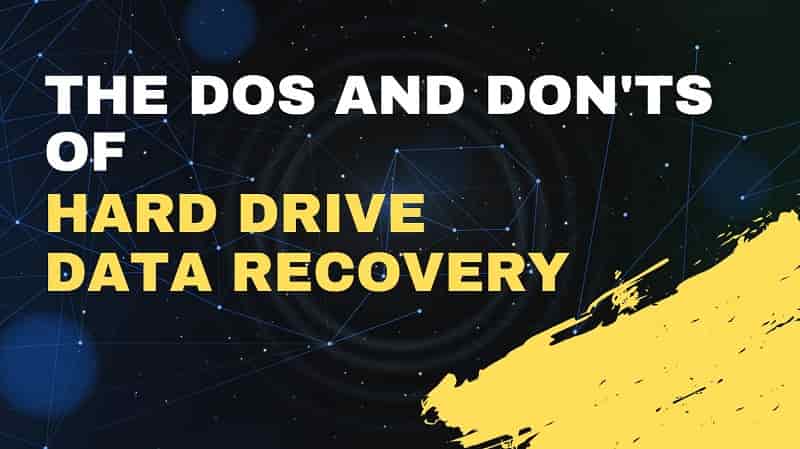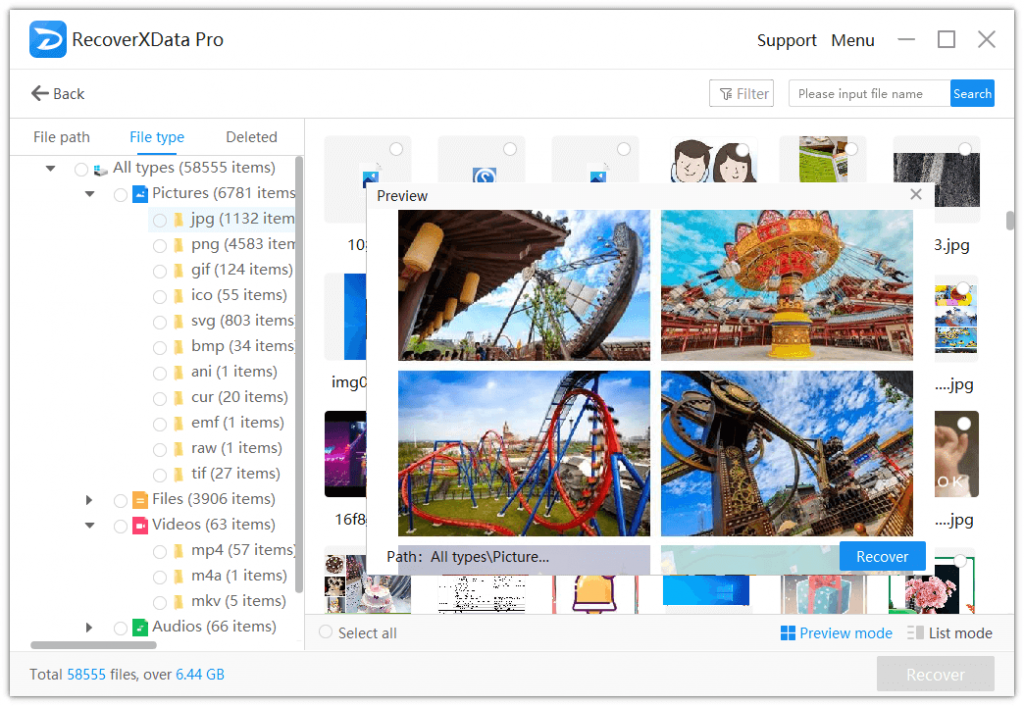The Dos and Don’ts of Hard Drive Data Recovery
Data loss can be a frustrating experience, particularly when it occurs on a hard drive that contains crucial information. While hard drives are generally reliable, they can sometimes fail, causing data loss. Fortunately, there are ways to recover lost data from a hard drive. However, data recovery can be a complex process, and there are dos and don’ts that you need to be aware of to ensure that you recover your data safely and effectively. Let’s check the dos and don’ts of hard drive data recovery now!

Contents of Dos and Don’ts of Hard Drive Data Recovery
Do: Stop Using the Hard Drive Immediately Don't: Attempt DIY Data Recovery Unless It's A Safe One Do: Choose a Reputable Data Recovery Service Don't: Use Unverified DIY Data Recovery Software Do: Back Up Your Data Regularly Don't: Panic Do: Keep Your Hard Drive Safe and Secure Don't: Ignore Warning Signs of Hard Drive Failure Do: Understand the Cost and Timeframe of Data Recovery Don't: Attempt to Recover Data From a Physically Damaged Hard Drive Do: Consider Preventative Measures Don't: Delay Data Recovery Conclusion
Do: Stop Using the Hard Drive Immediately
If you suspect that your hard drive is failing, the first thing you should do is stop using it immediately. Continuing to use a failing hard drive can cause further damage and potentially overwrite the data you want to recover. Shut down your computer and disconnect the hard drive. This will help to prevent further damage to the hard drive and improve the chances of successful data recovery.
Don’t: Attempt DIY Data Recovery Unless It’s A Safe One
Attempting DIY data recovery can be tempting, particularly if you are on a tight budget. However, if you are not using the right software, DIY data recovery can be risky and can cause further damage to your hard drive. It’s best to use a professional and easy-to-use data recovery to recover your data safely and effectively. Professional and save data recovery software like RecoverXData can help you recover data from various types of hard drives, including solid-state drives (SSDs), RAID arrays, and more.

Do: Choose a Reputable Data Recovery Service
Choosing a reputable data recovery service is crucial for successful data recovery. A reputable data recovery service will have a proven track record of success, will be transparent about its recovery process, and will have positive reviews from previous customers. Look for a data recovery service that offers a free diagnostic evaluation, so you can get an accurate estimate of the cost and timeline of the recovery process.
Don’t: Use Unverified DIY Data Recovery Software
Using unverified DIY data recovery software can cause further damage to your hard drive and can even make data recovery impossible. There are numerous data recovery software programs available online, but not all of them are effective. Some can even contain malware that can infect your computer and cause additional damage. It’s best to avoid using unverified software and instead opt for professional data recovery services.
Do: Back Up Your Data Regularly
Backing up your data regularly is the best way to ensure that you don’t lose your data in the event of a hard drive failure. Backing up your data to an external hard drive, cloud storage, or a backup service can help you recover your data quickly and easily. It’s recommended to back up your data at least once a week, depending on how frequently you use your computer.
Don’t: Panic
Data loss can be a stressful experience, but it’s essential to remain calm and focused. Panicking can lead to hasty decisions that can cause further damage to your hard drive or make data recovery impossible. Take a deep breath, assess the situation, and consider your options carefully. If you’re unsure what to do, consult a professional data recovery service for advice.
Do: Keep Your Hard Drive Safe and Secure
Keeping your hard drive safe and secure is essential for preventing data loss. Hard drives can be fragile and susceptible to damage from physical shock, extreme temperatures, and moisture. Avoid dropping your hard drive, and store it in a cool, dry place. Consider using a protective case or sleeve to protect it from scratches and other physical damage.
Don’t: Ignore Warning Signs of Hard Drive Failure
Hard drives can fail suddenly, but they often show warning signs before they fail completely. These warning signs can include slow performance, strange noises, and error messages. If you notice any of these warning signs, it’s essential to take action immediately to prevent further damage and data loss. Consult a professional data recovery service for advice on how to proceed with data recovery if you suspect that your hard drive is failing.
Do: Understand the Cost and Timeframe of Data Recovery
Data recovery can be a time-consuming and costly process, depending on the severity of the damage and the complexity of the recovery. It’s essential to understand the cost and timeframe of data recovery before proceeding with the process. A reputable data recovery service will provide you with an estimate of the cost and timeframe upfront, so you can make an informed decision about whether to proceed with the recovery process.
Don’t: Attempt to Recover Data From a Physically Damaged Hard Drive
Attempting to recover data from a physically damaged hard drive can cause further damage and make data recovery impossible. If your hard drive has suffered physical damage, such as a broken circuit board or damaged read/write heads, it’s best to leave data recovery to professionals. Attempting DIY data recovery on a physically damaged hard drive can lead to permanent data loss.
Do: Consider Preventative Measures
Preventative measures can help to reduce the risk of data loss due to hard drive failure. Regularly backing up your data, using anti-virus software, and avoiding physical shock and extreme temperatures can all help to prevent data loss. It’s also important to use high-quality hard drives from reputable manufacturers to reduce the risk of hardware failure.
Don’t: Delay Data Recovery
Delaying data recovery can decrease the chances of successful data recovery. The longer you wait, the more likely it is that your data will be overwritten or damaged further. If you suspect that your hard drive is failing, it’s essential to take action immediately to prevent permanent data loss.
Conclusion
Data loss due to hard drive failure can be a frustrating experience, but it’s important to remain calm and focused. The dos and don’ts of hard drive data recovery can help you recover your data safely and effectively. Remember to stop using your hard drive immediately if you suspect that it’s failing, choose a reputable data recovery service, back up your data regularly, and keep your hard drive safe and secure. By following these guidelines, you can increase the chances of successful data recovery and prevent permanent data loss.
The earlier the data is scanned, the more data will be recovered.
Recover Now

